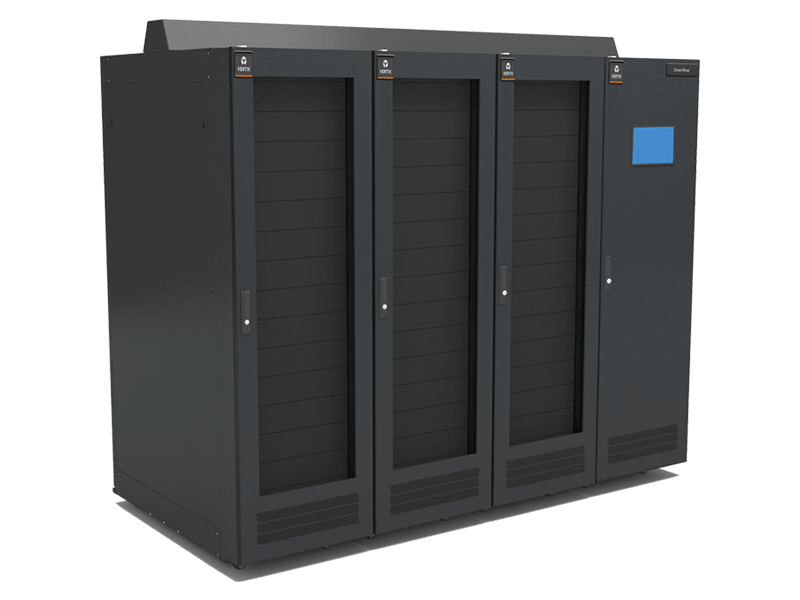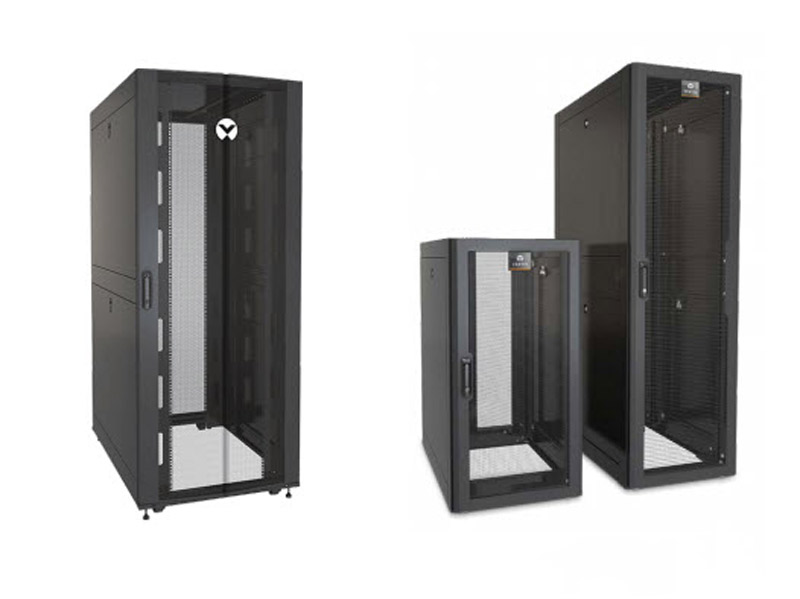The use of technology in education has evolved rapidly since computers and tablets were first introduced. Schools today are growing more dependent on IT systems for both teaching and learning—in the classroom and remotely. And that’s only part of the story. IoT devices are also being introduced to enhance security, improve climate control and reduce energy consumption.
Those changes are putting new demands on school IT infrastructure—and the staff that supports it. You may have numerous IT sites to manage, with the equipment in those sites operating in environments that were never intended to house IT.
Critical to the success of any school or university IT network is the uninterruptible power supply (UPS) systems that ensure power continuity and quality for IT systems. You need those systems to deliver reliable, long-lasting, “set it and forget it” protection. But traditional energy storage systems haven’t always made that possible. Enter, lithium-ion batteries.
Lithium-ion batteries versus traditional VRLA batteries:
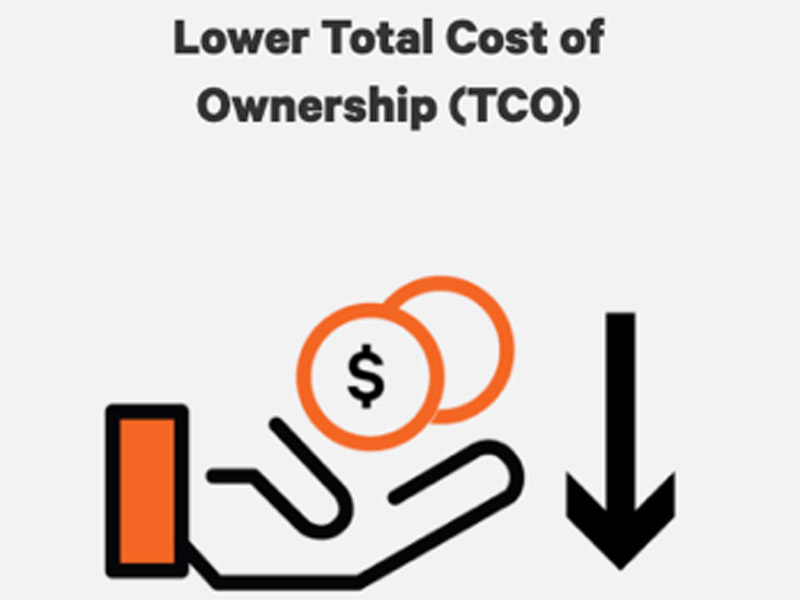 We know your resources might be limited and you may be operating on a tight budget.
We know your resources might be limited and you may be operating on a tight budget.
While the initial cost of lithium-ion batteries is still higher than lead-acid batteries, this cost difference is shrinking. Lithium-ion batteries can now provide a lower total cost of ownership than lead-acid batteries in as little as 5 years. Over the typical service life of a UPS, it is estimated that a lithium-ion battery system can provide a TCO savings of 40% or more.
We know your space is limited as well within a traditional network closet or even a shared space with non-IT equipment.
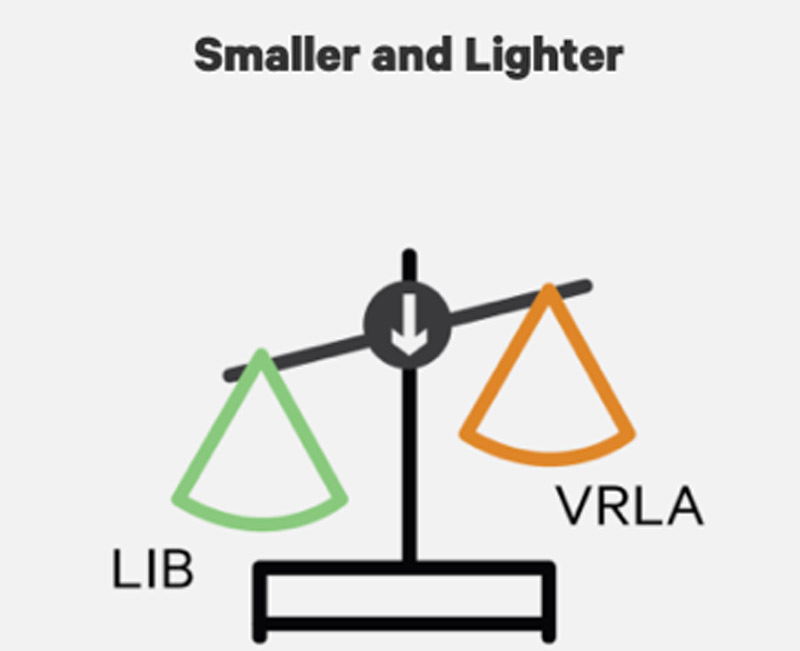 Lithium-ion batteries weigh about 60% less than lead-acid batteries. This makes the batteries easier to transport and install.
Lithium-ion batteries weigh about 60% less than lead-acid batteries. This makes the batteries easier to transport and install.
Lithium-ion batteries also can be up to 70% more compact than lead-acid batteries. This provides space savings in any on-site or remote facility, allowing you to reconfigure your deployment to increase available rack space for IT servers and networking equipment. The smaller size of lithium-ion UPS batteries also enables you to get far more runtime in the same amount of space – or the same runtime in a smaller space.
This makes lithium-ion batteries ideal for your small network closets or for the many distributed locations you might have around your district.
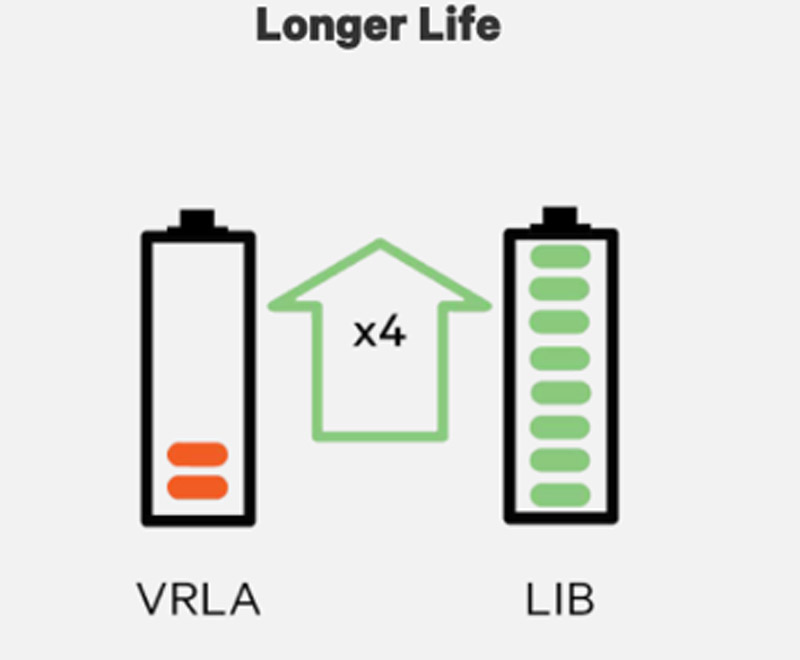 Lithium-ion batteries require less frequent replacement than VRLA batteries, freeing you up to tackle the other things on your IT to-do list.
Lithium-ion batteries require less frequent replacement than VRLA batteries, freeing you up to tackle the other things on your IT to-do list.
In fact, lithium-ion batteries last two to three times longer than lead-acid batteries, resulting in fewer battery replacements, less maintenance, and lower labor costs.
Lithium-ion batteries typically have a design life of eight to 10 years, which means they should have the same lifespan as a single-phase UPS. When a VRLA battery is at 80% capacity, or EOL, the lithium-ion battery is still at 93% capacity. This eliminates the pain of replacement since lithium-ion batteries don't have to be replaced every three to five years, which means huge cost savings. Also, lithium-ion batteries can be fully charged and stored for greater lengths of time than VRLA batteries, with minimal impact on the battery's lifespan.
 Once it is called upon to provide backup power, the UPS battery needs to be recharged, as quickly as possible, to full capacity. While VRLA batteries can take over 12 hours to charge from 0% to 90% of full runtime capacity, lithium-ion batteries charge in only 2 to 4 hours. That reduces the overall risk that you’ll suffer another outage before your UPS batteries have been fully charged.
Once it is called upon to provide backup power, the UPS battery needs to be recharged, as quickly as possible, to full capacity. While VRLA batteries can take over 12 hours to charge from 0% to 90% of full runtime capacity, lithium-ion batteries charge in only 2 to 4 hours. That reduces the overall risk that you’ll suffer another outage before your UPS batteries have been fully charged.
FAQs:
Q. Why should I consider switching to Lithium-ion batteries?
A. The greatest benefit of lithium-ion batteries is that you can set it and forget it. Your school would benefit greatly from the long battery lifetime and warranty. They have an anticipated lifespan of 10 years compared to the 3-5 year lifespan of VRLA batteries. You can also still use the traditional management cards that you use with VRLA batteries.
Q. Are lithium-ion batteries safe?
A. Yes. The type of lithium-ion batteries that are often seen in the media because of overheating problems, known as thermal runaway, is mainly used in mobile phones and electric scooters. The chemistries used in UPS applications have far more stringent packaging designs. Our lithium-ion UPS battery solutions have a failsafe shutdown mechanism that is activated in the event of a problem.
Q. This sounds great, but it seems too good to be true. What’s the catch?
A. Although the initial purchase price of lithium-ion batteries is higher than that of a traditional VRLA battery, the cost difference is shrinking. Once you factor in installation costs, delayed replacement savings, the value of the space saved, disposal expense, and maintenance costs, lithium-ion batteries have a significantly lower total cost of ownership.
Q. Do I need to overhaul my entire system at once?
A. No. You can operate different types of battery solutions within your infrastructure, allowing you to swap your traditional UPS for a product like the Vertiv Liebert PSI5 Lithium-Ion UPS whenever your budget and buying cycle allow. And, for a limited time, you can get special pricing on the Liebert PSI5 UPS with lithium-ion batteries when you trade in your existing UPS system.
Q. Are UPS systems with lithium-ion batteries eligible for e-rate funding?
A. Yes, in addition to traditional UPS’s, rack-mounted power strips and racks, UPS systems are vital to the reliable operation of education technology. UPS systems, including those with lithium-ion batteries, are eligible for e-rates, providing extra funding you can use to prepare your infrastructure for the future of education. Because of the extended lifespan of lithium-ion, they are nearly perfect for e-rate because they are a longer-term investment.
Q. Are these eligible for trade-in pricing?
A. Yes. Vertiv’s trade-in program does cover our lithium-ion UPS solutions. Speak to your Vertiv representative on how to set up the trade-in with proper removal and disposal of the old UPS unit along with the installation of the new UPS.
To help determine whether a lithium-ion UPS is right for you, check out our TCO calculator.



